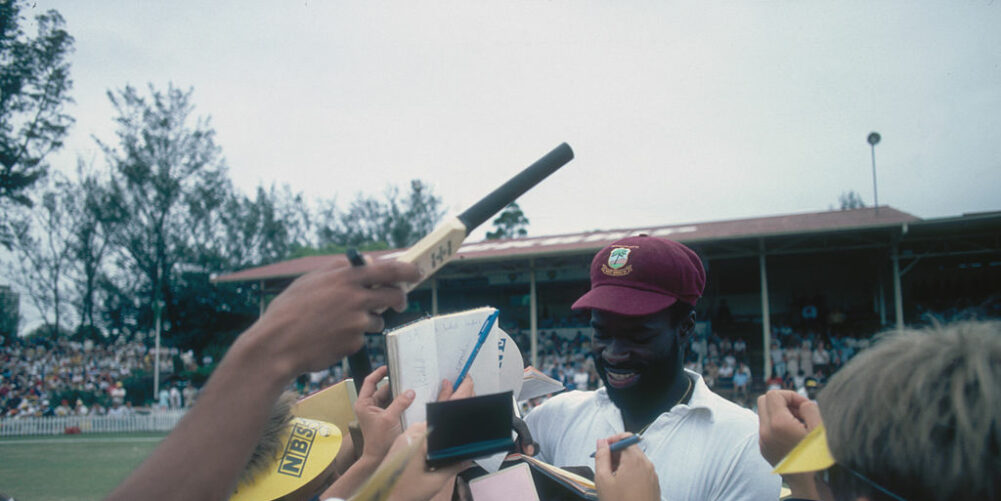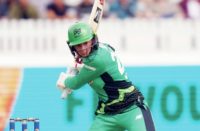Heroes: West Indies all-rounder Franklyn Stephenson signs autographs during the Rebels Tour of 1983 (photo: Adrian Murrell/Getty Images)
By Peter Hayter
Eyes slightly narrowed, fixing you in a laser-gaze from which it is impossible to break free, teeth clenched tight behind tighter lips.
During the best part of the two decades when Sir Vivian Richards was, without question, the finest batsman on the planet and all the years since, this is the look he has employed to concentrate the mind of opposing bowlers, errant team-mates, unhelpful umpires, hopeless administrators and clueless media men alike.
Its meaning is simple and to the point – I advise you to pay attention now, because I am deadly serious.
Prior to seeing it again on the eve of the first Test of the Investec series between England and West Indies at Edgbaston, I had encountered it at relatively close hand four times before.
I was introduced to it on the outfield at Sabina Park, Jamaica, in early 1989, just after England had upset the odds by winning the first Test match ever broadcast live by Sky TV when, on the way to the post match Press conference, I conveyed a message from the producer requesting an interview with their lead commentator Tony Greig.
Never forgiven, nor forgotten in those parts for his injudicious promise to make West Indies “grovel” prior to the 1976 series in England, Greig was not likely to get a man-hug or a high-five from an old and respected adversary. What I got instead, on his behalf, was the look and one single word. No.
The second occasion happened during the final Test of the same series on his home island of Antigua, when the recipient was a national paper reporter whose story, which amounted in essence to Richards refusing to talk to him on his day off, had been splashed all over the front page back in the UK, then shown to him by fax shortly before the start of play.
Just as Vic Marks, his long-time colleague at Somerset turned to ask if anyone knew why the West Indies captain was not leading his team onto the field that morning, there he appeared at the back of the Press box, quietly suggesting to the hack in question where he might stick his portable typewriter. You could hold the menace in that moment in your hands.
Phil Tufnell was never the bravest against the kind of fast bowling with which West Indies pacemen hurried up far more technically sound and less cowardly batsmen than he.
But England’s eccentric left-arm spinner is perhaps the only man in cricket history to admit to having been scared that one of their batsmen might do him physical harm.
In his autobiography, Tuffers recalls what happened in Richards’ last Test when, in the final match of the 1991 series at the Oval, he prepared to bowl at the Masterblaster for the first time.
“There was nothing for it,” he wrote. “I simply had to bowl the ball. I did. I gave it my best looping, spinning, ball-on-a-string. It was cleverly flighted and dropping on a perfect length… and Viv played it with his dark eyes closed. Then he looked at me from under that peaked West Indies cap, a strange piercing look of contempt. ‘Is that the best you have, Philip?’ said the look. ‘Is that it? Is that what I walked all the way out here to bat against?’ And I thought to myself, ‘Jesus Christ almighty, this bloke is going to whack me everywhere’. For a second I actually thought I was actually going to faint.”
Those who know Richards well and have enjoyed that innate sense of fun and mischief which have made time spent in his company a blast (and having been kidnapped by him and his great friend Sir Ian for their evil purposes on more than one occasion I know whereof I speak) understand that he only uses the look when he needs to, or feels he has been pushed to it or when there is no alternative.
Which is why seeing it come over his face while he took a break from taking part in a coaching event down the road from Edgbaston on Wednesday made such an impression.
He was responding to the sad thought that, with some of their best players absent through their own choice of playing franchise cricket instead of for the West Indies, notwithstanding their success in the last World T20, the West Indies he and his contemporaries had taken to the top of world cricket with such honour, dignity and ferocious unity of purpose were now putting out teams unable to qualify for the Champions Trophy and ranked eighth among Test playing nations.

Administrators distracted by self-interest were one reason, but then there was this.
“It hurts. No West Indies in the Champions Trophy felt like the Premier League without Chelsea or Arsenal. I felt pretty low.
“When I was playing we may have been leaders in our time, but long before us, from Sir Learie Constantine onwards, there was a legacy and I do not believe some of these individuals in the current day understand what that means.
“Maybe we haven’t got the individuals in the set-up at present to filter through what some of this stuff is all about.
“When I was a player we had our differences, but what stood us out to such a degree was the fact that when you put on that maroon cap there was sense of pride about it. I want to see that again.”
As always the look behind the words said: I advise you to pay attention now, because I am deadly serious.
There are those who think it is long past time those running West Indies cricket and those who continue to choose not to play for them did just that.
Sir Viv Richards, Sir Curtly Ambrose, Sir Andy Roberts and Sir Richie Richardson were speaking at a Wicketz programme delivered by the UK’s leading youth cricket and disability sports charity, the Lord’s Taverners. To find out more, visit lordstaverners.org















